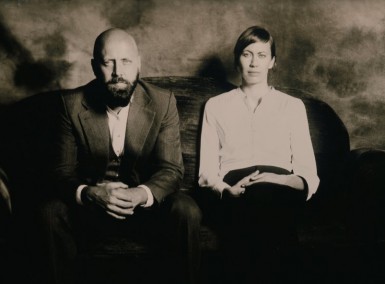
Photo by J. Konrad Schmidt
What’s the main inspiration for your lyrics? Do you write them on your own or together with your brother?
My brother is my editor who looks through it when I’ve finished the first draft. But I’m writing them. Aftermath for example is a story about a long-term friendship of mine. And the story is a bit more abstractly composed, so that everyone is able to understand and relate to it. Most of the time it’s things that concern me or a theme which currently affects me – nothing special. Or simply something which totally burdens or delights me at the moment. Actually the themes pretty close to me but I always try to take a step aside and find a special way to get there.
How does it feel like to make music with his own brother? Is it easier because you know each other pretty well or is it sometimes just annoying?
Both. I never had another band, so I can’t compare it to anything else. I think it’s super and also that you can be more honest without destroying anything. More honest and more direct, so to speak.
What do your sessions look like?
They’re always the same. We’re sitting together in front of the piano, Philipp plays one of his ideas to me, for example, or we’re writing an idea together and searching for a vocal melody – sometimes he’s already got one, or I’ve got one which I like, or I also wrote something and then we’re assembling it. And every song starts with piano and vocals. That’s always the basis: piano and vocals . Then I write the lyrics, Philipp starts producing and we’re always meeting while the song’s developing itself and I’m showing him new drafts. He’s saying: ‘What do you think of this bass drum?’ And I’m saying ‘Awesome’ or ‘Horrible’ and then he’s looking for another one or we’re arguing about it. It’s not a strict writing session in principle, we’re doing everything kind of simultaneously.
How has the collaboration with the British producer David Pye been?
It was pretty virtual, we never met him in person. We just skyped with him. [laughs] It was a great collaboration, a lot via e-mail – we uploaded every track and worked with every song what we imagined and desired. But the songs were almost ready by the time he received them. He also just produced about half of the album. I would almost call it mixing. Thus he mixed and produced. And he added single elements. It was pretty good to let it go and that somebody else puts his mark on it. It really benefited the music, as I think. The collaboration has been a bit strange because we’ve never seen each other but therefore it worked out really well. He’s a very friendly guy who did his best to do everything how we’ve imagined. He really ploughed without end for three weeks.
In which genre would you sort your new album respectively your music?
I think I’m leaving that to you. [laughs] That’s one of those things.You can write electropop, but that doesn’t feel quite right. I think it’s totally difficult to classify it.
You’re touring through Germany in March. What can fans expect from a show? I’ve seen you on your first tour and back then you’ve worked a lot with visuals. Will those play a part in your live show again?
Yes, but they’ll change of course. On stage, we’ll be a trio, we have a drummer for the live-shows. And the stage-show will be next level, I would say. But I don’ want to say what we’ll be exactly doing. It’ll be brilliant in any case. We’re in the brainstorming-phase at the moment- things are built, designed. Currently it’s a pretty exiting time and I’m totally looking forward to this new stage-show. It will be awesome! [laughs]
Do you prefer the studio or the stage?
That’s such different conditions. Spiritual conditions. I feel extremely comfortable on stage, I really like it. That’s a very pure moment, when you’re entering the stage. You know that there are people with whom you can share your new music, or whatever. That’s a pretty special moment that I love. But of course the thrilling thing about the life as a musician is that you’ve have these two extremes which are almost a bit schizophrenic. On on side you’re somehow sitting for a year and half in the studio and never see the sun – okay, it could be a lot worse. You’re just working. And then this other extreme, you’re living on the motorway for weeks, jumping from one concert to the next, which is also exhausting. Both are extreme situations, as I think. But that’s what is always thrilling about the profession.
Are there any special rituals before you’re going on stage?
Yes, we’re all meet backstage. The light-man, visuals-man, sound-man, Philipp and I. And then we build a circle and put all our hands on each other and everyone’s screaming at once : ‘Now it’s getting tropical!’ [laughs]
“Tropical?” Where does that come from?
I actually don’t exactly know. Some crazy idea in some city, I can’t remember. [laughs]
What do hope and passion mean to you?
On one hand, that question is very private and you need to think a lot about it. Very thrilling. [thinking] My passion is 100% in this project. And I have passion for many other things. Passion is a motor. But that sounds like a simple platitude and therefore I’m struggling with it. And hope is a motor as well, as I think. Both are motivating forces. And I think you need a healthy amount of both in your life.
—



